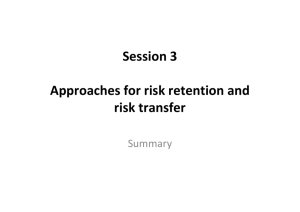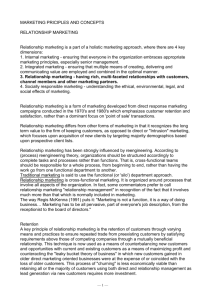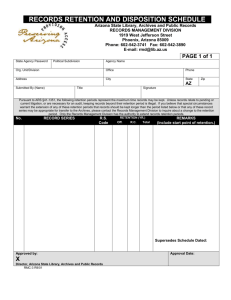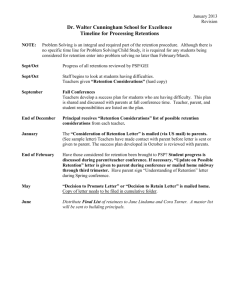employment record retention requirements
advertisement
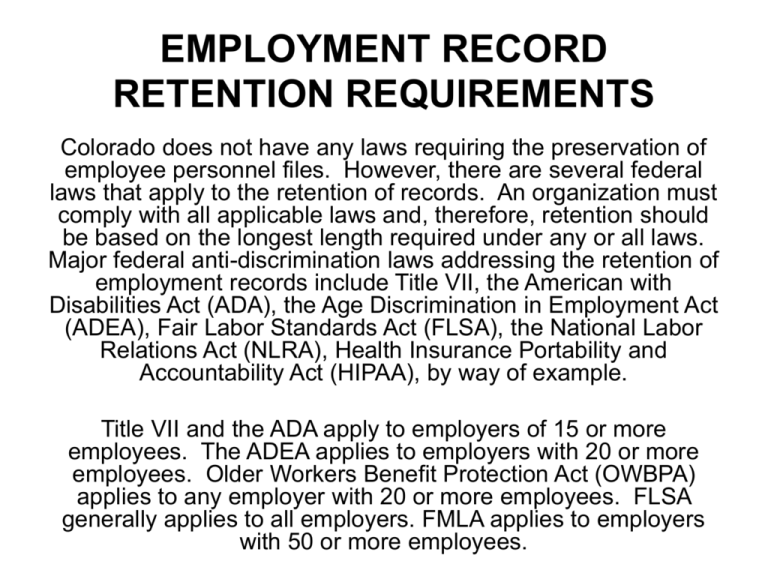
EMPLOYMENT RECORD RETENTION REQUIREMENTS Colorado does not have any laws requiring the preservation of employee personnel files. However, there are several federal laws that apply to the retention of records. An organization must comply with all applicable laws and, therefore, retention should be based on the longest length required under any or all laws. Major federal anti-discrimination laws addressing the retention of employment records include Title VII, the American with Disabilities Act (ADA), the Age Discrimination in Employment Act (ADEA), Fair Labor Standards Act (FLSA), the National Labor Relations Act (NLRA), Health Insurance Portability and Accountability Act (HIPAA), by way of example. Title VII and the ADA apply to employers of 15 or more employees. The ADEA applies to employers with 20 or more employees. Older Workers Benefit Protection Act (OWBPA) applies to any employer with 20 or more employees. FLSA generally applies to all employers. FMLA applies to employers with 50 or more employees. Documents Related to Recruitment, Selection and Compensation RECORD TYPE Hiring documents, including job applications, resumes, job inquiries, and records of refusals to hire Promotion, demotion, transfer, selection for training, layoff, recall or discharge Test papers completed by applicants or candidates for any position; results of any physical examination if such is considered in connection with a personnel action Payroll records or other records containing name, address, birth date, occupation, pay rate and other compensation terms RETENTION PERIOD 1 year from date of personnel action (such as date application submitted) 1 year from the date (2 years generally recommended to err on side of caution, given number of laws that may be applicable) 1 year 3 years (4 years generally recommended to error on the side of caution, given the number of laws that may be applicable) RECORD TYPE RETENTION PERIOD Payroll records, collective bargaining agreements and any changes to such agreements, individual contracts, written agreements under the FLSA, sales and purchase records, and certificates and notices of Wage and Hour Administrator 3 years (4 years generally recommended) INS Form 1-9 Employment Eligibility Verification Form 3 years after the date of hire or 1 year after date of termination, whichever is later Employer Information Report EEO-I Form/Report Maintained for the duration of a pending complaint or litigation. EEO-1s must be updated annually, and the most recent version must be available for review. RECORD TYPE Form EEO-4 (Records submitted to the EEOC documenting compliance with EEOC requirements by organizations with 15 or more employees.) Fair Credit Reporting Act Records, including investigations by consumer and reporting agencies to help employers make hiring or employment-related decisions, including consumer report disclosure to employees, consumer report authorizations from employees, employer certifications to credit reporting agencies, reports from reporting agencies, and summary of rights Military Leave of Absence records RETENTION PERIOD 3 years Individuals may bring claims under FCRA 2 years after violation of Act Employees may spend up to 5 years on active duty and still be eligible for reemployment (5 years plus current year after leave commences) RECORD TYPE RETENTION PERIOD Tax-related Records 4 years Certificates of Age Until termination of employment Polygraph tests 3 years RECORD TYPE RETENTION PERIOD Alcohol Test Results a. concentration greater than 0.02 (5 years) b. concentration less than .02 (1 year) Controlled Substance Test Results a. driver verified positive test results (5 years) b. negative and cancelled test results (1 year) Test Refusal Documentation 5 years

